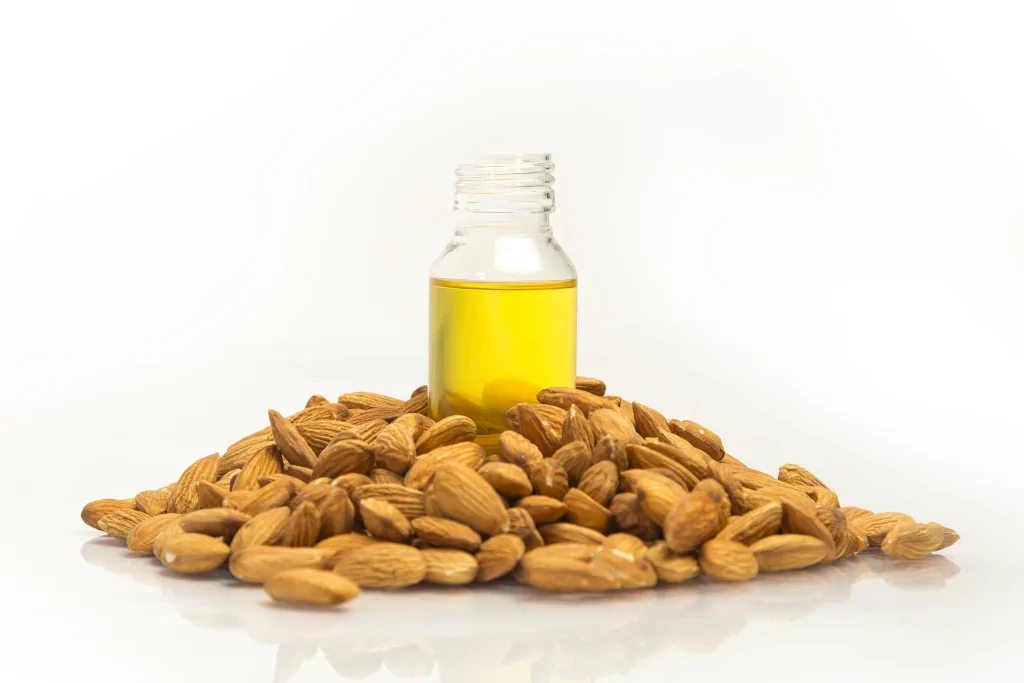We’re always searching for ways to keep our feline companions happy and healthy, but not every remedy or product is cat-friendly. You might have stumbled upon almond oil and wondered, “Is almond oil safe for cats?”
Let’s explore what makes almond oil a topic of debate among pet owners and uncover safer alternatives to ensure your cat’s well-being.

Essential Oils and Feline Health: What’s Safe?
Cats are known for their curiosity, but they’re also sensitive creatures. When it comes to essential oils and feline health, it’s crucial to do our homework.
Some essential oils, like lavender and chamomile, are generally considered safe for cats when properly diluted and used sparingly.
However, not all oils are created equal, and certain essential oils, like tea tree and citrus oils, can be toxic to our feline friends.
As we venture into the world of almond oil, keep in mind that moderation and caution are key.
The Truth About Almond Oil: Is It Safe for Cats?
Almond oil, derived from sweet almonds, is known for its moisturizing and soothing properties.
While it’s not classified as an essential oil, it can be used on cats when applied topically and in moderation. The key here is moderation, as excessive use may lead to adverse reactions or skin irritations.
To err on the side of caution, always consult your veterinarian before introducing almond oil or any other new product into your cat’s grooming routine, as individual sensitivities can vary.
Potential Risks of Using Almond Oil on Your Cat
- Skin Irritation. Almond oil is generally safe for cats, but some felines may have an allergic reaction or sensitivity to it. When using almond oil, watch for signs of redness, itching, or inflammation at the application site. If you notice any adverse reactions, discontinue use and consult your veterinarian.
- Over-grooming. The new scent and texture of almond oil on their fur may prompt cats to groom excessively, which could lead to ingestion of the oil. While almond oil is not toxic when ingested in small amounts, excessive consumption could cause digestive issues. To minimize this risk, apply almond oil sparingly and only on targeted areas.
- Risk of Infection. Applying almond oil to open wounds or sores can lead to infection, as it may trap bacteria or dirt in the affected area. If your cat has any open wounds, consult your veterinarian for appropriate treatment options.
Benefits of Almond Oil: Is It Worth the Risk?
- Soothes Dry Skin. Almond oil is rich in fatty acids, making it an excellent moisturizer for cats with dry or irritated skin. When used in moderation, it can help alleviate itching and discomfort caused by skin conditions like dandruff or allergies.
- Promotes a Healthy Coat. Almond oil can improve the appearance of your cat’s fur, making it shinier and more vibrant. Regular use can also reduce shedding and matting, making grooming sessions more manageable and enjoyable for both you and your feline friend.
- Supports Wound Healing. Almond oil has mild anti-inflammatory properties that can aid in the healing of minor cuts or abrasions. However, as mentioned earlier, do not apply almond oil to open wounds without consulting your veterinarian first.
Weighing the risks and benefits, almond oil can be a valuable addition to your cat’s grooming routine when used responsibly.
Always consult your veterinarian before introducing any new products, and closely monitor your cat for any signs of adverse reactions. By taking these precautions, you can safely explore the potential benefits of almond oil and help your cuddly cat look and feel their best.
Safer Essential Oil Alternatives for Cats
If you’re considering essential oils for your cat, it’s important to choose ones that are safe and non-toxic. Some safer alternatives to almond oil include:
- Lavender Oil. Renowned for its calming properties, lavender oil can help soothe anxious or stressed cats when diffused in low concentrations. When diffusing lavender oil, ensure proper ventilation and monitor your cat for any signs of discomfort or adverse reactions.
- Cedarwood Oil. A natural flea and tick repellent, cedarwood oil can be added to your cat’s shampoo or applied topically in a diluted form to keep pesky pests at bay. Make sure to choose a high-quality, therapeutic-grade cedarwood oil, as synthetic or low-quality oils can be harmful to your cat.
- Frankincense Oil. With its anti-inflammatory and immune-boosting properties, frankincense oil can be used topically in a diluted form to help improve your cat’s overall skin health. Always perform a patch test on a small area of your cat’s skin and observe for any signs of irritation before applying diluted frankincense oil more broadly.
Always consult with your veterinarian before using any essential oils on your cat, and use them in low concentrations to avoid causing irritation or discomfort.
Are these oils safer than almond oil? It is important to note that each cat may have different sensitivities to essential oils, so there isn’t a one-size-fits-all answer about which oil is the safest. The oils I mentioned earlier are generally considered safer for cats when used properly, diluted, and in consultation with a veterinarian.
However, individual responses may vary. It’s crucial to always monitor your cat for any signs of discomfort or adverse reactions and to consult with a veterinarian before introducing any essential oils to your cat’s environment or applying them topically.
FAQs
How do I properly dilute almond oil for cat use?
To properly dilute almond oil for cat use, mix one teaspoon of almond oil with 4 teaspoons of a carrier oil, like coconut or olive oil. This creates a 20% dilution, which is considered safe for most cats. Always test a small area first and consult your veterinarian for advice.
What are the signs of an essential oil overdose in cats?
Signs of essential oil overdose in cats may include drooling, vomiting, difficulty breathing, tremors, weakness, and unsteady gait. If you suspect your cat has been exposed to toxic essential oils, seek immediate veterinary assistance.
Can I use almond oil to treat my cat’s skin issues?
Almond oil can be used to treat your cat’s skin issues, such as dryness or irritation, as it is a natural moisturizer. However, always consult with your veterinarian before using almond oil, especially if your cat has a skin condition or open wounds.
Are there any essential oils that are toxic to cats?
Essential oils that are toxic to cats include citrus oils (like lemon, orange, and bergamot), eucalyptus, tea tree, and peppermint, among others. Always consult your veterinarian before using any essential oils on or around your cat.
Alex, a passionate animal lover, has experience in training and understanding animal behavior. As a proud pet parent to two dogs and three cats, he founded AnimalReport.net to share insights from animal experts and expand his knowledge of the animal kingdom.




